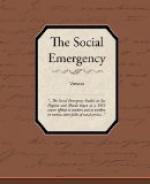This statement is doubtless oftener true of the sex life of boy children than of girl children; but it is a fact and a very important fact, and it lies at the bottom of the problem when we come to consider the details of instructional method. If it were not for these facts, it would make no difference who imparted sex information to the child, so the facts were accurately told; and it would make no difference what facts were given, or at what age the child received them, if no lies were conveyed. But because the child’s physical and mental sex life awakens early, and because every child has latent tendencies to abnormality and latent responsiveness to the abnormal, it is of critical importance that we decide who shall teach the individual child, when the child shall be informed, and what the child shall be told. It is of critical importance because, if the instruction comes wrongly, we may, even with good intentions, contribute to the very abnormality that we wish to forefend or overcome. With some children we could perhaps safely take chances so far as the self-awakening sex life is concerned if we did not know that it is impossible, without more harm than good to keep the child from such perfectly normal relations with other children as almost certainly will expose it to disastrous misinformation a suggestion.
Whatever ought to be said of the importance of the home tradition and ideals and the general physical and moral regimen of the child (and these are of supreme importance), the facts of the last two paragraphs lay the ground for this general statement: that in the case of a child whose moral and sexual environment has been bad and perverting, proper sex instruction cannot make matters worse, whereas in the best families much harm may arise from the lack of such instruction.
If any information is imparted to the child at all, the first instruction should properly come from one or other of the child’s parents. It is sometimes the case that opportunity for the first information is presented when the child asks questions. And the supposed question of the child is, “Where did the baby come from?” Our course would be much smoother if every child asked its mother or father this question, or if every child began with this particular question, or if every child asked any question at all. Sometimes the child asks the nurse this question; sometimes the child is an only child or for some other reason this question never occurs to it; sometimes the child’s first question pertains to some curiosity about its own navel, or “where eggs come from,” or “why the hen makes them,” or “how they get into the hen,” or what is meant by “half shepherd and half St. Bernard.” But children do not ask the questions that the books say they ask, and ready-made answers do not always apply.




